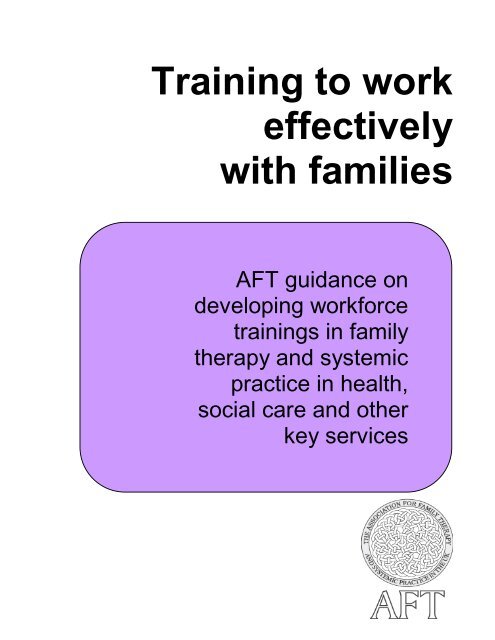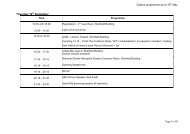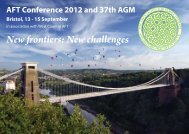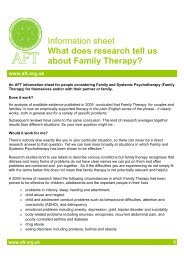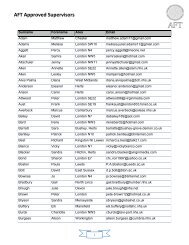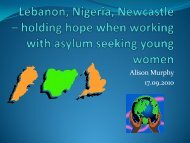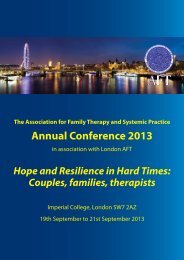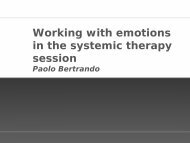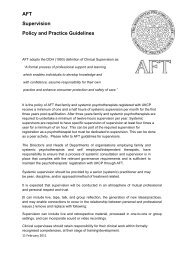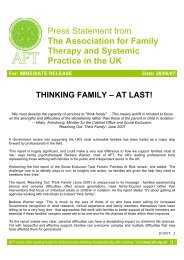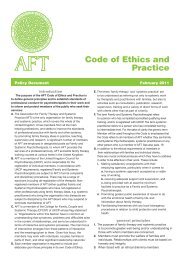guidance on developing workforce training - AFT
guidance on developing workforce training - AFT
guidance on developing workforce training - AFT
You also want an ePaper? Increase the reach of your titles
YUMPU automatically turns print PDFs into web optimized ePapers that Google loves.
Training to workeffectivelywith families<strong>AFT</strong> <str<strong>on</strong>g>guidance</str<strong>on</strong>g> <strong>on</strong><strong>developing</strong> <strong>workforce</strong><strong>training</strong>s in familytherapy and systemicpractice in health,social care and otherkey services
<strong>AFT</strong>: TRAINING TO WORK EFFECTIVELY WITH FAMILIES 2ForewordThis document offers <str<strong>on</strong>g>guidance</str<strong>on</strong>g> for <strong>developing</strong> andsupporting <strong>workforce</strong> <strong>training</strong>s in family therapy andsystemic practice across key UK services.Developing <strong>workforce</strong> <strong>training</strong>s will help put families andcarers at the heart of high quality UK services, supporting:Family-sensitive systemic practice, promoting resilienceand well-being of all family members and supportingindividuals and families facing difficultiesbetter safeguarding of vulnerable children, young peopleand adults, identifying and challenging the seriousdifficulties and damaging behaviours that may lie behindchild and adult distressincreased staff awareness of and skills in working inpartnership with familiesa shift in culture, from working solely with individuals toworking in ways that enhance and use the strengths offamilies and other caring networksThese developments require:1. staff equipped with the skills necessary to work withfamilies effectively and safely2. Supported by robust structures of c<strong>on</strong>sultati<strong>on</strong> andsupervisi<strong>on</strong> with more experienced and qualifiedprofessi<strong>on</strong>als, who can work with those familiesexperiencing more serious and complex problems
<strong>AFT</strong>: TRAINING TO WORK EFFECTIVELY WITH FAMILIES 3Training to work effectively with families<strong>AFT</strong>, the Associati<strong>on</strong> for Family Therapy and Systemic Practice, has a l<strong>on</strong>g history ofsetting <strong>training</strong> standards and designing and m<strong>on</strong>itoring systemic and family therapy<strong>training</strong>s, from introductory modules to specialist Masters level and further <strong>training</strong> insupervisi<strong>on</strong>. It has the experience, skills and expertise to support and work withorganisati<strong>on</strong>s and services in the Public, Voluntary and Independent Sectors to develop<strong>workforce</strong> tailored to staff and client group needs.The <str<strong>on</strong>g>guidance</str<strong>on</strong>g> outlined here describes 6 levels of <strong>training</strong>. Together these <strong>training</strong>modules create staff development pathways from very basic skills and understanding inworking with families, to full clinical and supervisory qualificati<strong>on</strong>s. These higher levels of<strong>training</strong> equip staff to work with families with serious and complex needs, and to support<strong>workforce</strong> development through <strong>training</strong> and supervisi<strong>on</strong>The framework thus offers a <strong>training</strong> and organisati<strong>on</strong>al development programme tobuild services and staff skills in working with families, couples and other networks ofcare in health, social care and other key services.The <strong>training</strong> of each <strong>workforce</strong> is based <strong>on</strong> a pyramid structure, with all staff trained tolevel 1 and increasingly smaller groups trained to more specialist levels. This structureallows the effects of <strong>training</strong> to be utilised to the full, and prevents skills being lost orunder-used. (The experience of some other <strong>training</strong>s such as Thorne <strong>training</strong>s in adultmental health has been that taught skills were lost quickly when there was insufficientsupervisi<strong>on</strong> and support in the workplace). The experience of the “Somerset Model” 1<strong>training</strong> dem<strong>on</strong>strates the importance of having a clear strategic plan to guide anddevelop <strong>training</strong> and for this to be fully understood and supported at the most seniorlevels of management.Suggested Levels of TrainingIntroductory Level 1Level 2Intermediate Level 3Level 4Advanced Level 5Level 6
<strong>AFT</strong>: TRAINING TO WORK EFFECTIVELY WITH FAMILIES 4INTRODUCTORYIn terms of delivery these introductory modules in family sensitive systemic practice could beincorporated into core professi<strong>on</strong>al and in-service <strong>training</strong>s, as well as being available asdiscreet modules delivered internally or externally. There is dem<strong>on</strong>strable value in providing<strong>training</strong> to whole teams. The <strong>training</strong> would be specific to a particular service area.LEVEL 1AimsTo develop staff understanding of the importance of family sensitive and family inclusiveapproaches in a particular field of work. Identify particular issues and c<strong>on</strong>straints and to developskills in communicati<strong>on</strong> with families and family members.Length and format of <strong>training</strong>2 days plus 1 follow-up day a m<strong>on</strong>th later to review and reinforce practice developmentTarget GroupAll staff in public and third sector services who meet with children, young people and adults in‘helping’ and/or ‘caring’ capacities, including; teachers, mental health nurses, doctors, policeofficers, GPs, general nurses, health and social care key workers.CurriculumThe importance of the family and other c<strong>on</strong>texts to individual well being in the particular area ofworkThe impact <strong>on</strong> the family of stressful family and external events relevant to particular area ofworkEthics (including c<strong>on</strong>fidentiality)Development of some c<strong>on</strong>cepts and language to describe family and family interacti<strong>on</strong>sBasic awareness of the importance of family beliefs, culture, structure, expectati<strong>on</strong>s, life cycleexperiences etcBasic listening and communicati<strong>on</strong>s skills with more than <strong>on</strong>e pers<strong>on</strong> in the roomBasic skills in c<strong>on</strong>vening, listening and talking with family groupsCompetencies to be achieved.(All competencies will relate to a particular area of work e.g. police officer, nursery worker)Basic awareness of the individual in the family c<strong>on</strong>textBasic awareness of family members’ and carers’ needs, experiences, wishes and resourcesBasic understanding of the impact of the problem <strong>on</strong> the family and the family <strong>on</strong> the problemBasic sensitivity to diverse family forms and beliefsAbility to communicate more effectively with family members
<strong>AFT</strong>: TRAINING TO WORK EFFECTIVELY WITH FAMILIES 5INTRODUCTORY LEVEL 2AimsTo build <strong>on</strong> LEVEL 1 to equip staff with improved skills in family sensitive and inclusiveapproaches and enabling them to c<strong>on</strong>vene and facilitate family meetings within which familymembers and professi<strong>on</strong>als can effectively exchange views and make appropriate decisi<strong>on</strong>s tothe area of work Also to identify difficulties and c<strong>on</strong>straints to communicati<strong>on</strong>.Length and Format of Training5 days (2x2-day blocks and 1 day follow up)Target GroupFor professi<strong>on</strong>als who may meet with families and family members as part of their existingpractice, including health visitors, teachers in relevant roles, including those with pastoral careduties and SENCO’s; police officers, housing workers, care home staff, social workers,CurriculumC<strong>on</strong>vening family meetingsEngaging family members in meaningful c<strong>on</strong>versati<strong>on</strong>s, including those who have tended to beunder-represented in mainstream services (inc fathers; grandparents and others with significantrole in children’s lives etc).Obtaining and giving informati<strong>on</strong>Managing differences that arise in c<strong>on</strong>versati<strong>on</strong>sIdentifying possible sources of risk and need and how to seek sources of further helpSupporting families to explore issues and experiences that may initially be difficult address.Developing basics of self-reflexive, culturally sensitive and ethical practiceBasic communicati<strong>on</strong> with children, and young people.Addressing and managing challenges of particular area of workCompetenciesTo keep the family in mind when carrying out designated roleTo recognise family resourcesTo gather views of family members and develop a collaborative way of workingAbility to meet and talk purposefully with more than <strong>on</strong>e pers<strong>on</strong> in the room when carrying outdesignated role.
<strong>AFT</strong>: TRAINING TO WORK EFFECTIVELY WITH FAMILIES 6Ability to identify and work towards collaborative practice with familiesAbility to c<strong>on</strong>sider and c<strong>on</strong>sult appropriately <strong>on</strong> ethical issues of family sensitive and inclusivepracticeFacilitating family discussi<strong>on</strong>s of difficulties, priorities and decisi<strong>on</strong> makingDem<strong>on</strong>strate awareness of cultural c<strong>on</strong>text and power differences within familiesAbility to identify the need for more specialised interventi<strong>on</strong>INTERMEDIATE LEVELThis is a more substantial <strong>training</strong> for those likely to have significant meetings with families intheir day-to-day work, equipping them with skills to better carry out their existing roles and totake part in therapeutic family meetings and assessment processes. Helping families to setgoals, and problem solve and to identify risks in family relati<strong>on</strong>ships and take appropriate acti<strong>on</strong>.Divided into two levels which together equate to the current <strong>AFT</strong> intermediate level of <strong>training</strong>.This means that there is also a career or <strong>training</strong> progressi<strong>on</strong> (where this is appropriate) to thespecialist <strong>training</strong>s in family and systemic psychotherapy (MSc level), which would equip someprofessi<strong>on</strong>als to deliver highly specialised work with families and be involved in research anddevelopment of services.Level 3 and level 4 <strong>training</strong>s could be delivered in a variety of ways including team or servicefocused <strong>training</strong>s, <strong>training</strong>s within local authorities or NHS trusts or provided externally. Theycould focus <strong>on</strong> a narrow area e.g. working with psychosis or be more generic. For every<strong>on</strong>e<strong>training</strong> at this level there would be an expectati<strong>on</strong> that the skills could be more generally appliede.g. an adult mental health worker able to manage a family sessi<strong>on</strong> to which small children wereinvited.Both level 3 and level 4 <strong>training</strong>s would include some supervised clinical work throughout thecourse.LEVEL 3AimsTo familiarise practiti<strong>on</strong>ers with a range of theories relating to family and systems and to enablethem to use them in their assessment and work with families. To enable them to use a range oftechniques to intervene effectively within their professi<strong>on</strong>al role in order to help families toidentify their strengths, improve their decisi<strong>on</strong> making, problem solving and communicati<strong>on</strong>. Toenable them to describe and formulate family interacti<strong>on</strong>, identify areas of risk and manageappropriate referral.Target Group
<strong>AFT</strong>: TRAINING TO WORK EFFECTIVELY WITH FAMILIES 7Relevant staff groups include hospital family and carer liais<strong>on</strong> workers, teachers with specifichome-school liais<strong>on</strong> resp<strong>on</strong>sibilities, health visitors, General Practiti<strong>on</strong>ers wishing to developtheir skills in working with children, vulnerable adults and families., social workers, communitymental health nurses, occupati<strong>on</strong>al therapists, psychiatrists and all CAMHS workers.Length and format of <strong>training</strong>15 days over 6 m<strong>on</strong>ths to 1 yearCurriculumA range of theories and techniques relating to systemic practice.Advanced interviewing skillsMaking therapeutic relati<strong>on</strong>ships which enable professi<strong>on</strong>al to support family to changeThe family life cycle and critique and limitati<strong>on</strong>sSocial c<strong>on</strong>structi<strong>on</strong>ism and the shaping of ideas, behaviours and relati<strong>on</strong>ships by socialc<strong>on</strong>texts.Family formulati<strong>on</strong>Evidence base for family interventi<strong>on</strong>sHow to carry through a number of key techniques focused <strong>on</strong> change.Supervised and live supervised practiceCompetenciesTo be able to dem<strong>on</strong>strate advanced interviewing skillsTo successfully c<strong>on</strong>vene families and parts of families as appropriateTo make and maintain effective therapeutic relati<strong>on</strong>shipsTo formulate families and family relati<strong>on</strong>shipsTo plan and carry out a piece of therapeutic work focused <strong>on</strong> a particular problem or issueTo understand and apply the evidence base to clinical decisi<strong>on</strong> making.To understand the impact of practiti<strong>on</strong>ers own ways of thinking and reacting <strong>on</strong> the workTo understand the impact of the work <strong>on</strong> themselvesTo build <strong>on</strong> family strengths
<strong>AFT</strong>: TRAINING TO WORK EFFECTIVELY WITH FAMILIES 8To communicate about families and their relati<strong>on</strong>ship to difficulties in both spoken and writtenformTo manage the ethical complexities of work with families, identify risk and take appropriateacti<strong>on</strong>To apply theories in practice and use interventi<strong>on</strong>s appropriatelyTo be able to apply a manualised versi<strong>on</strong> of therapy in <strong>on</strong>e area of work e.g. parent <strong>training</strong>To identify the need for more specialist referral.LEVEL 4AimsTo build <strong>on</strong> the knowledge and skills gained at Level 3 and to help the practiti<strong>on</strong>er to developskills and ability and to apply a range of theory and techniques to families in order to help thempositively change their relati<strong>on</strong>ships beliefs and behaviour. This would go bey<strong>on</strong>d problemsolving to make changes that would enable them to manage life better in the future.To develop aspects of relati<strong>on</strong>ship that are c<strong>on</strong>nected with resilience. To address powerdifferences in the therapy and to develop a sophisticated awareness of addressing and workingwith difference of all kindsLength and Format of <strong>training</strong>15 days over 6 m<strong>on</strong>ths to 1 yearTarget GroupRelevant staff groups include hospital family and carer liais<strong>on</strong> workers, teachers with specifichome-school liais<strong>on</strong> resp<strong>on</strong>sibilities, health visitors, General Practiti<strong>on</strong>ers wishing to developtheir skills in working with children, vulnerable adults and families, social workers, communitymental health nurses, occupati<strong>on</strong>al therapists, psychiatrists and all CAMHS workers, who wantto take their <strong>training</strong> further and to improve competence in working for more sustained change infamily relati<strong>on</strong>ships.CurriculumDeveloping culturally sensitive practiceWorking with power and differenceManagement of a series of sessi<strong>on</strong>s into a useful piece of workMaking the most of endingsHelping families to develop more hopeful narratives
<strong>AFT</strong>: TRAINING TO WORK EFFECTIVELY WITH FAMILIES 9Managing child protecti<strong>on</strong> issues.Parenting approachesFamily interventi<strong>on</strong>s and other specific interventi<strong>on</strong>sManaging a series of sessi<strong>on</strong>s with beginning middle and endDealing with endings in an effective wayWorking with c<strong>on</strong>flictWorking with families around illness and disabilityFamily and parenting assessmentWorking with couplesTo actively use self reflexivity in sessi<strong>on</strong>sSupervised and live supervised practiceCompetenciesTo apply a wide range of interventi<strong>on</strong>s appropriatelyTo successfully manage an extended piece of workTo reflect and use reflecti<strong>on</strong>s <strong>on</strong> self of therapist and how it impacts <strong>on</strong> workTo critically appraise work and actively seek the feedback from clients through the work.To work in more difficult areas of c<strong>on</strong>flict and child protecti<strong>on</strong>To develop a greater range of strategies for engaging children and adolescentsTo apply thinking and practice to professi<strong>on</strong>al systems.To be able to apply a manualised versi<strong>on</strong> of therapy in <strong>on</strong>e area of work e.g. parent <strong>training</strong>To identify the need for more specialist referral.To be able to use measure for assessing effectiveness of interventi<strong>on</strong>sUp to this point in professi<strong>on</strong>als are being trained to work with families in the c<strong>on</strong>text of their ownprofessi<strong>on</strong>al area of expertise. In this current atmosphere of cost cutting we will have to make avery positive case for the need for more highly qualified provisi<strong>on</strong>. We need to be clear aboutthe extra value of some<strong>on</strong>e who has d<strong>on</strong>e the full psychotherapy <strong>training</strong>. The specificcompetencies will be developed in the revisi<strong>on</strong> of the Blue Book but below I will outline somepossibilities.
<strong>AFT</strong>: TRAINING TO WORK EFFECTIVELY WITH FAMILIES 10ADVANCED LEVELLEVEL 5Level 5 comprises of two years post graduate <strong>training</strong> (part time) resulting in a clinicalqualificati<strong>on</strong> as Family and Systemic Psychotherapists. This equips professi<strong>on</strong>als to offer ahighly specialised service to families and family members experiencing serious and complexdifficulties, c<strong>on</strong>sult to teams and organisati<strong>on</strong>s and deliver <strong>training</strong>s to professi<strong>on</strong>als with lowerlevels of qualificati<strong>on</strong> and experience. Professi<strong>on</strong>als trained at this level would have the skill andflexibility of applicati<strong>on</strong> to work across the age ranges and presentati<strong>on</strong>s so is well placed to leadand develop family sensitive services.It would be suitable for practiti<strong>on</strong>ers within CAMHS, adult mental health, and social care .whowish to develop advanced skills in working therapeutically with families experiencing seriousdistress and complex difficulties. Some<strong>on</strong>e trained at this level would be able to support thework of those with lower levels of <strong>training</strong>.It would be equivalent to the current MSc in Family and Systemic Psychotherapy. Graduatesfrom this <strong>training</strong> would be eligible to apply for registrati<strong>on</strong> as a psychotherapist. They would beequipped to work as lead and/or sole therapist with families with complex difficulties and to takefull clinical resp<strong>on</strong>sibility for family work and c<strong>on</strong>tribute specialist skills to a multi- disciplinaryteam. They would have the skills to evaluate work and develop and support services and newinitiativesCurriculumAdvanced understanding and applicati<strong>on</strong> of a wide range of theories into practice.Practice across a range of presentati<strong>on</strong>s and agesPost graduate researchWorking with teams and organisati<strong>on</strong>Combining family and systems approaches with other psychological and physical therapiesAdvanced applicati<strong>on</strong> of 2 manualised approachesSelf and relati<strong>on</strong>al reflexivityWorking in situati<strong>on</strong>s of high risk, c<strong>on</strong>flict and distressSupervised and live supervised practice of complex work across age ranges and presentati<strong>on</strong>sCompetenciesThere are a wide range of competencies and below is <strong>on</strong>ly a summary. Thesecompetencies are well reflected in the Skills for Health occupati<strong>on</strong>al standards forSystemic Psychotherapy. <strong>AFT</strong> was centrally involved in the development of these
<strong>AFT</strong>: TRAINING TO WORK EFFECTIVELY WITH FAMILIES 11standards. Other informati<strong>on</strong> can be found in the <strong>AFT</strong> “Blue Book” (<strong>training</strong> standardsand system of accreditati<strong>on</strong>).To dem<strong>on</strong>strate ability to adapt practice to a wide range of client groups and presentati<strong>on</strong>sacross the age range.An ability to work at high level of complexity and with serious and entrenched difficulties.An ability to work appropriately in situati<strong>on</strong>s of high risk, c<strong>on</strong>flict and distress.An ability to adapt work to different client presentati<strong>on</strong>sAn ability to make decisi<strong>on</strong>s about the care plan elements and how these may be deliveredAn ability to develop ways of working that are sensitive to differences of culture, race, age,sexuality e.t.c.An ability to facilitate multi disciplinary network meetings and c<strong>on</strong>sult to organisati<strong>on</strong>al teams.An ability to combine work with other approaches and deliver 2 manualised approaches e.g.parenting approaches, IPT or Systemic CBTAbility to use self reflexivity in their workAdvanced ethical understanding and its applicati<strong>on</strong> in practiceAn ability to make detailed and complex assessments including those for court proceedingsAn ability to work in a collaborative way which enhances family strengths and develops familyresilience.An ability to make complex assessments and provide expert reports for courts.An ability to audit and research practice and service deliveryCompetence in working independently as part of a team or in individual private practice.SUPERVISORY/CONSULTANTLEVELLEVEL 6While psychotherapists at level 5 are equipped to offer c<strong>on</strong>sultati<strong>on</strong> and supervisi<strong>on</strong> to a basiclevel, there is great value in specialist supervisi<strong>on</strong> <strong>training</strong>s. Because of the systemicframeworks ability to look at things in a complex and holistic fashi<strong>on</strong> the supervisi<strong>on</strong> <strong>training</strong>enables them to provide c<strong>on</strong>sultati<strong>on</strong> across disciplines.These <strong>training</strong>s run over a year and involve a high level of supervisory practice to individualsand groups and include skills in live supervisi<strong>on</strong>. Practiti<strong>on</strong>ers at this level are able to offer highlevel <strong>training</strong> to different levels and are a valuable resource within services. Sometimes thesupervisi<strong>on</strong> <strong>training</strong> is combined with a research dissertati<strong>on</strong> and/or study in a particular clinicalarea to lead to a clinical doctorate.
<strong>AFT</strong>: TRAINING TO WORK EFFECTIVELY WITH FAMILIES 12REFERENCES1Stanbridge,R.I. and Burbach,F.R. (2007) Developing Family Inclusive Mainstream Mental Health Services.Journal of Family Therapy. Vol 29:1 21-44.Stanbridge, R. and Burbach, F. (2007) Involving carers Part 1: Including carers in staff <strong>training</strong> and servicedevelopment in Somerset, U.K. Chapter 5 in: Families as Partners In Care: A Guidebook forImplementing Family Work. Tor<strong>on</strong>to: Worldwide Fellowship for Schizophrenia and AlliedDisorders.Burbach, F. and Stanbridge, R. (2008) Training to develop family inclusive routine practice and specialistfamily interventi<strong>on</strong>s in Somerset. Journal of Mental Health Workforce Development. Vol 3:2 23-31.Stanbridge,R.I.,Burbach,F.R.,and Leftwich,S. (2009) Establishing family inclusive acute inpatient mentalhealth services: a staff <strong>training</strong> programme in Somerset. Journal of family Therapy.Vol 31: 1-17(inpress – July publicati<strong>on</strong>).<strong>AFT</strong>, the Associati<strong>on</strong> for Family Therapy and Systemic Practice,7 Executive Suite,St James Court,Wilderspool Causeway,Warringt<strong>on</strong>CheshireWA4 6PS.Tel 01925 444414 .


